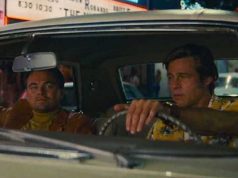George Reeves had minor roles in dozens of studio films in the 1940s but was unable to secure anything noteworthy until 1951 when, at the age of 37, he became TV’s first Superman. Eight years later, he shot himself in the head.
Or maybe he didn’t. “Hollywoodland,” a sophisticated and pulpy detective story in the tradition of “Chinatown” and “L.A. Confidential,” examines the long-lived rumors that Reeves was murdered. Certain elements of the crime scene suggested foul play — the shell casing being found under his body, the fact that no one called the police for 45 minutes — but it was ruled a suicide and officially closed. Still, the rumors lingered.
Whether or not the gunshot was self-inflicted, Reeves’ death was a dichotomy, maybe even ironic. (Faster than a speeding bullet, eh?) Such duality is all over the place in the film, as befits a movie about Hollywood, land of actors and other phonies. Nearly every character is cheating on his or her spouse, living a double life of some kind, or putting on a public facade. Even the movie itself is two-faced, split into dual timelines, one telling Reeves’ life story and the other following a detective who investigates his death.
The detective, Louis Simo (Adrien Brody), is a sweaty gumshoe who spends his days spying on jealous husbands’ unfaithful wives. Eager to make a name for himself, he looks into the Reeves death at the behest of Reeves’ grieving mother (Lois Smith), an unsteady old woman who, yes, has a secret side to her, too.
Simo learns that Reeves had a long-standing affair with Toni Mannix (Diane Lane), wife of a top MGM exec (Bob Hoskins) and Reeves’ apparent sugar-mama, at least before the Superman money started rolling in. Yet Reeves was also engaged to be married to one Leonore Lemmon (Robin Tunney), a youthful golddigger who was present the night he died. Both women had motive to kill Reeves, as did Toni’s husband and any number of other Hollywood movers and shakers.
In the flashbacks, which are integrated fluidly into the 1959-set detective scenes, George Reeves is played by Ben Affleck in what is probably the best performance of his career. With his square face and strong chin, Affleck bears a passing resemblance to Reeves, and he modulates his voice just right, too, capturing Reeves’ unctuous, almost insincere-sounding charm.
We first meet him around 1950, when his B-movie roles have dried up and he’s about to become desperate. “The Adventures of Superman” makes him a huge star, yet it also confines him. One scene, based on a largely untrue Hollywood legend, shows studio execs drastically reducing his role in 1952’s “From Here to Eternity” after test-screening audiences make Superman jokes whenever he appears. (“Look! Up on the screen!”) He makes goofy public appearances in his Superman get-up, thrilling children but diminishing his morale. He constantly pleads with Toni to use her influence on her husband to get him a contract with MGM — anything to get out of these tights.
HBO veteran Allen Coulter (“The Sopranos,” “Sex and the City”) directs the film with a kind of restrained enthusiasm, telling the juicy story eagerly but refraining from wallowing in the seedier aspects. He uses noir-ish music (by composer Marcelo Zarvos) to enhance the old-time private eye feel, and the colors (by cinematographer Jonathan Freeman) are washed-out, as if having been exposed to too much L.A. sunshine.
All of this complements Paul Bernbaum’s screenplay, which is full of wry dialogue and Sam Spade-worthy twists and turns. The people in the film aren’t men and women but guys and dolls, the sort of characters who smoke cigarettes in holders and walk around with tumblers of Scotch before noon. The fact that the bulk of what’s going on here is true, more or less, merely gives it dimension. It would be a cracking good story anyway.
Adrien Brody is billed as the lead, and that’s probably accurate. The story is ultimately the detective’s, not Reeves’; the entirety of the Superman TV show’s six-year run is represented by only one scene in the movie. Louis Simo is a fractured man, too, newly divorced from his wife (Molly Parker) and struggling to be a positive influence in the life of his young son, Evan (Zach Mills). Like all boys his age, Evan is devastated by Reeves’ death. How could Superman kill himself? And how could he use a Luger — a NAZI gun — to do it? It’s just another contradiction in a world full of them, and Simo, played sympathetically by Brody, wants to help his boy sort it out.
“Hollywoodland” is a biopic, technically, but it feels more vibrant than that, less like a museum piece and more like a real old-fashioned pulp tale. Moreover, the film uses the duplicitous and shady characters of Hollywood not just for amusement but to underscore the story’s larger themes. All the film’s parts work together, in other words, making for an unflaggingly interesting whole.
B+ (2 hrs., 6 min.; )





